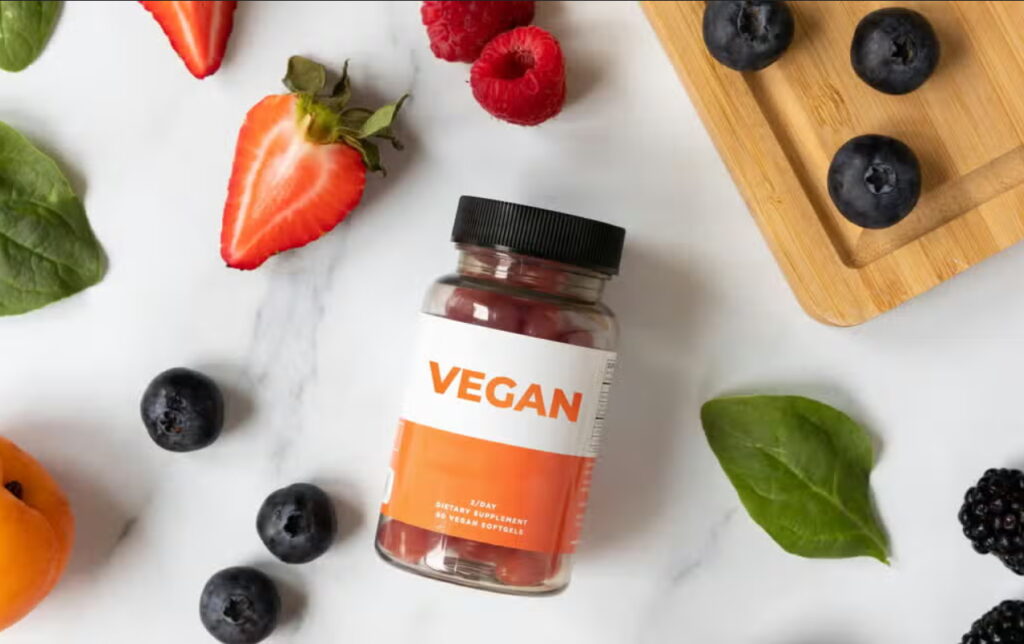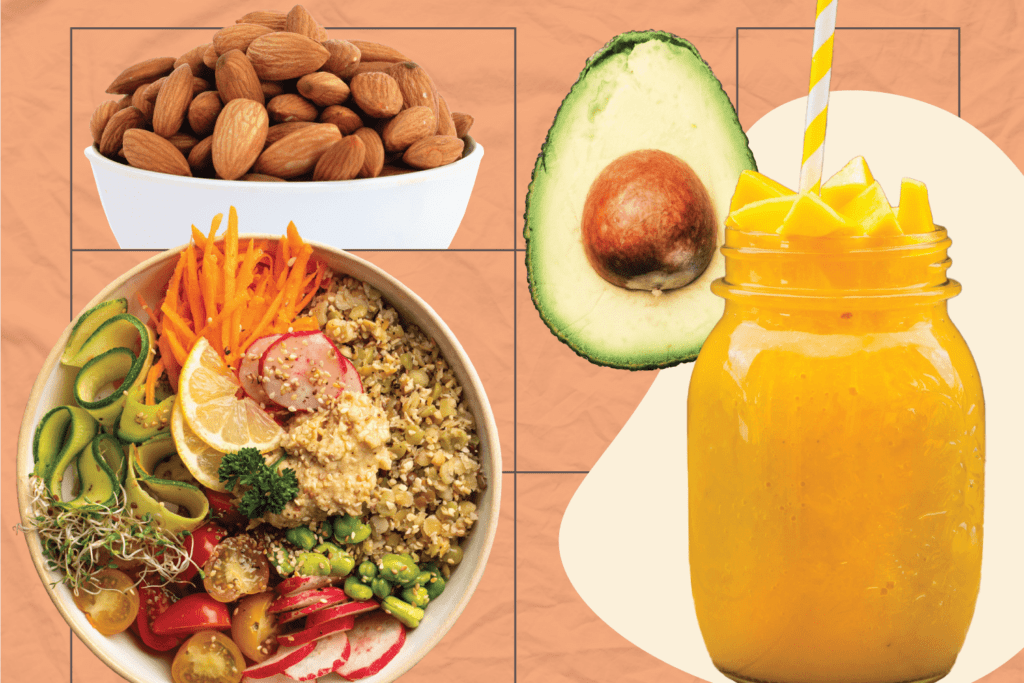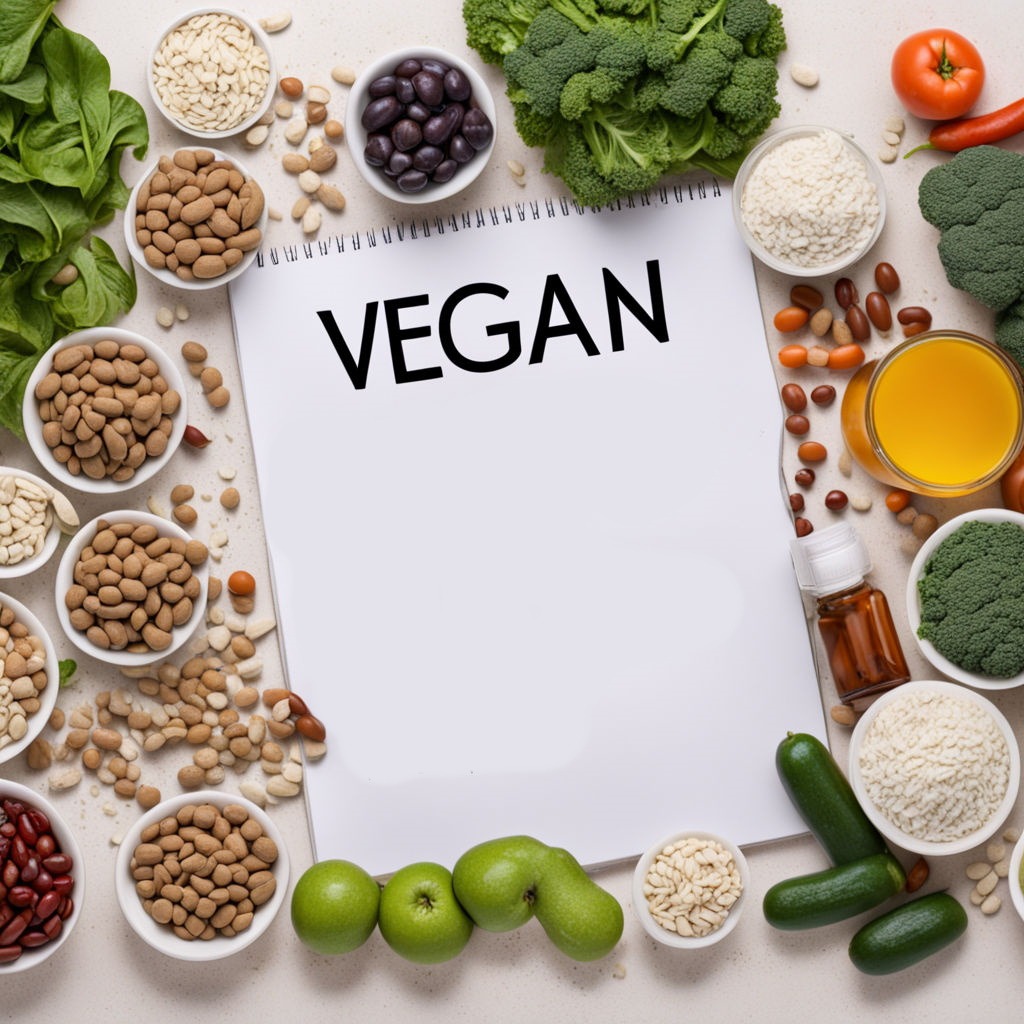
Introduction
The vegan lifestyle has been gaining traction globally, driven by ethical, health, and environmental considerations. This dietary choice is increasingly reflected in consumer habits, including the rising interest in vegan dietary supplements. In the UK alone, the number of vegans has seen significant growth, with an estimated 2.5 million people adhering to a vegan diet as of 2024, up from 1.4 million in 2023 (Viva). This shift is part of a broader trend observed worldwide, where veganism is not just about food but extends into areas like healthcare, fashion, and beyond, influencing a wide array of industries (Food Revolution Network).
The purpose of this article is to delve into the world of vegan weight loss supplements, examining their types, effectiveness, and safety. With the increase in vegan populations, the demand for dietary supplements that comply with vegan ethics continues to grow, prompting a need for a detailed look at these products to ensure they meet both health standards and ethical considerations.
What Are Vegan Weight Loss Supplements?
Vegan weight loss supplements are dietary products designed specifically to support weight loss while adhering to the principles of a vegan diet, meaning they contain no animal products or by-products. These supplements are formulated from plant-based sources and often cater to those looking to lose weight without compromising their ethical or dietary restrictions.
Key Ingredients in Vegan Weight Loss Supplements
- Green Tea Extract: Rich in antioxidants, particularly catechins, green tea extract is frequently used in vegan weight loss supplements for its potential to boost metabolism and enhance fat burning.
- Caffeine: Often derived from natural sources like coffee beans or tea, caffeine is included for its ability to increase energy expenditure and fat oxidation, making it a common component in weight management products.
- Garcinia Cambogia: This tropical fruit extract is popular for its hydroxycitric acid content, which is thought to inhibit an enzyme that helps produce body fat and could potentially suppress appetite.
Distinction Between Vegan and Non-Vegan Supplements
The primary difference between vegan and non-vegan weight loss supplements lies in their composition. Non-vegan supplements may contain ingredients sourced from animals such as gelatin (often used in capsules), omega-3 fatty acids from fish oil, or other animal-derived substances. Vegan supplements strictly avoid these components, instead relying on plant-based capsules and ingredients that conform to vegan standards.
These distinctions are crucial for consumers who not only want to maintain a vegan diet but also seek products that are consistent with vegan ethical practices, ensuring that no animals were harmed or utilized in the production of the supplement. This adherence to vegan principles is a significant factor for many in choosing the right supplement to support their weight loss and health goals. This article at NIH provides deeper look at vegan diet.

Types of Vegan Weight Loss Supplements
Fat Burners
Fat burners are designed to increase metabolism, enhance fat oxidation, and sometimes reduce fat absorption. They typically contain natural stimulants that accelerate the body’s fat-burning process. Examples of vegan fat burner ingredients include:
- Green Tea Extract: Known for boosting metabolic rate.
- Caffeine: Stimulates thermogenesis, which increases energy expenditure.
- Capsaicin: Found in chili peppers, helps to increase calorie burning.
- These ingredients work synergistically to help reduce body fat more effectively than dieting alone.
Appetite Suppressants
Appetite suppressants help reduce hunger cravings, which can lead to a lower caloric intake. Common vegan-friendly appetite suppressants include:
- Glucomannan: A dietary fiber from the konjac root that expands in the stomach to help you feel full.
- 5-HTP (5-Hydroxytryptophan): A compound that can increase serotonin levels in the brain, thereby enhancing satiety and reducing appetite.
- Garcinia Cambogia: Contains hydroxycitric acid, which is believed to inhibit an enzyme that converts carbohydrates into fat.
- These supplements are particularly useful for controlling portion size and decreasing the likelihood of overeating.
Metabolism Boosters
Metabolism boosters are supplements designed to increase the metabolic rate, allowing the body to burn more calories at rest and during activity. Key ingredients include:
- B Vitamins: Play a crucial role in metabolizing proteins, fats, and carbohydrates.
- Chromium Picolinate: Helps regulate blood sugar levels, which can affect energy and metabolism.
- Coenzyme Q10: Aids in energy production at the cellular level, enhancing overall metabolism.
- These ingredients help improve metabolic efficiency, making it easier to lose weight even with moderate diet and exercise.
Meal Replacements
Meal replacements are convenient, nutritionally balanced products such as shakes and bars designed to provide a full meal’s nutrients with fewer calories. Vegan meal replacements are made exclusively from plant-based ingredients and often include:
- Pea, Soy, or Rice Protein: Provide essential amino acids for muscle repair and growth.
- Fiber: From sources like oats or flaxseeds, which help to keep you feeling full.
- Vitamins and Minerals: To ensure that dietary needs are met, especially when reducing calorie intake.
- These products are perfect for busy individuals who might not have the time to prepare a balanced, low-calorie meal but are still looking to maintain a healthy weight.
Each type of supplement has its mechanism and role in weight management, and choosing the right one can depend on individual dietary preferences, lifestyle, and specific weight loss goals. Lean more about vegan diet supplements types at Healthline.
Effectiveness of Vegan Weight Loss Supplements
Review of Scientific Studies and Clinical Trials
Scientific research on vegan weight loss supplements offers mixed results, primarily due to the variety of ingredients and the complexity of diet and metabolism. For instance:
- Green Tea Extract: Studies have shown that green tea extract, particularly rich in catechins, can moderately increase calorie burning and fat oxidation. A meta-analysis published in the International Journal of Obesity concluded that subjects consuming catechin-rich teas lost more weight than those who did not.
- Garcinia Cambogia: Research on this supplement has been more inconclusive. Some studies suggest that it might prevent fat storage and control appetite, while others find no significant effect on weight loss.
- Caffeine: Known for its metabolism-boosting properties, caffeine has been consistently shown to increase metabolic rate in the short term, as per research cited in the American Journal of Clinical Nutrition.
- Personal Testimonies and Case Studies
Personal stories from individuals who have used vegan weight loss supplements often highlight positive experiences and noticeable results in terms of weight management and overall energy levels. However, these anecdotes should be considered with caution as they are subjective and may not reflect typical outcomes.
Limitations and Challenges in the Existing Research
One of the primary challenges in evaluating the effectiveness of vegan weight loss supplements is the variability in study design, supplement formulations, and participant characteristics. Other limitations include:
- Small Sample Sizes: Many studies have limited participants, reducing the generalizability of the findings.
- Short Duration: Weight loss studies are often short-term, making it difficult to assess long-term effects and sustainability of weight loss.
- Confounding Variables: Factors such as other dietary habits, exercise, and genetic predispositions can influence the outcomes of the studies.
- Despite these challenges, the growing interest in plant-based diets is likely to spur more detailed and extensive research in the future. For those considering vegan weight loss supplements, it’s crucial to consult healthcare providers and consider these supplements as part of a broader lifestyle change involving diet and exercise.
Safety and Regulatory Concerns

Potential Side Effects and Health Risks
Vegan weight loss supplements, like all dietary supplements, can pose potential health risks and side effects depending on the ingredients and dosages used. Common issues include:
- Caffeine: High doses can lead to nervousness, insomnia, heart palpitations, and increased blood pressure. It’s particularly risky for individuals with pre-existing heart conditions.
- Garcinia Cambogia: Some reports link it to liver toxicity, although these cases are rare. Other possible side effects include digestive upset and headaches.
- Green Tea Extract: In high amounts, it has been associated with liver damage and other health issues. It is generally safe in moderate amounts but should be used cautiously.
- It’s important to follow the recommended dosages and be aware of any personal sensitivities or allergies.
Regulatory Overview and the Role of Organizations Like the FDA
In the United States, the Food and Drug Administration (FDA) is responsible for regulating dietary supplements, including vegan weight loss supplements. However, the regulatory framework is less stringent than for pharmaceuticals. Supplements:
- Are not required to be approved by the FDA before they are marketed.
- Must be labeled correctly and must not contain harmful ingredients.
- Manufacturers are responsible for ensuring the safety and labeling of their products before they reach the market.
- The FDA steps in primarily when a product already on the market is proven to be unsafe or improperly labeled.
Tips for Safely Incorporating These Supplements into a Vegan Diet
- Consult with Healthcare Providers: Before starting any supplement regimen, it’s crucial to consult with a healthcare provider, especially if you have underlying health conditions or are taking other medications.
- Research Products Thoroughly: Look for supplements that have been third-party tested by organizations such as NSF International or the US Pharmacopeia (USP). These certifications can help ensure the product meets certain standards for quality and safety.
- Start with Lower Doses: When trying a new supplement, start with a lower dose than recommended to see how your body reacts before fully incorporating it into your routine.
- Monitor Your Body’s Response: Pay close attention to how your body reacts after taking the supplement. Any adverse reactions should be taken seriously and considered in consultation with healthcare professionals.
By understanding the potential risks and regulatory landscape, consumers can make more informed decisions and safely integrate vegan weight loss supplements into their health regimen, aligning with both their dietary preferences and wellness goals. More information on safety of vegan supplements are at NIH.
Natural Alternatives to Vegan Supplements for Weight Loss
Dietary Approaches: Emphasizing Whole, Plant-Based Foods
Focusing on a diet rich in whole, plant-based foods is a great way to naturally support weight loss. Foods such as fruits, vegetables, whole grains, legumes, nuts, and seeds are not only nutrient-dense but also high in fiber, which can help you feel fuller for longer. This approach can lead to a natural reduction in calorie intake without the need for processed supplements. Incorporating a variety of these foods can ensure a balanced intake of vitamins and minerals, crucial for overall health and effective weight management.
Lifestyle Modifications: Exercise, Sleep, and Stress Management
- Exercise: Regular physical activity is essential for burning calories and building muscle, which can boost your metabolism and aid in weight loss. Aim for a mix of cardiovascular exercise, strength training, and flexibility workouts.
- Sleep: Adequate sleep is vital for weight loss. Poor sleep can disrupt hormones that regulate appetite and hunger, making you more likely to overeat. Strive for 7-9 hours of good-quality sleep per night.
- Stress Management: High stress levels can lead to weight gain, particularly around the midsection, by increasing the hormone cortisol, which drives appetite and cravings. Techniques such as mindfulness, yoga, and regular physical activity can help manage stress effectively
Many herbs and spices are touted for their metabolism-boosting properties and can be easily integrated into your diet:
- Green Tea: Drinking green tea or adding green tea extract to foods can boost your metabolism and aid fat burning thanks to its high antioxidant content.
- Cayenne Pepper: Contains capsaicin, which has thermogenic properties; it helps increase the amount of heat your body produces, making you burn more calories per day.
- Cinnamon: Can help regulate blood sugar levels, which can aid in weight loss by reducing hunger and minimizing insulin spikes.
- Turmeric: Contains curcumin, which is linked to reductions in inflammation and can support metabolism and weight management.
These herbs and spices can be incorporated into meals and drinks throughout the day, making them a convenient and natural way to enhance your weight loss efforts without the need for supplements. Whether adding a dash of cinnamon to your morning oatmeal or sipping on green tea throughout the day, these small changes can contribute significantly to your overall calorie burn and health.
Consumer Tips: Choosing the Right Supplement

What to Look for on Labels and What to Avoid
When selecting a vegan weight loss supplement, it’s important to read labels carefully to ensure
the product aligns with both vegan ethics and safety standards:
- Look for ‘Certified Vegan’ Labels: These confirm that the product doesn’t contain any animal-derived ingredients.
- Check for Allergens: Some supplements may contain common allergens like soy or nuts.
- Inspect the Ingredient List: Avoid products with artificial additives, fillers, or excessive sweeteners. Ingredients should be recognizable and simple.
- Look for Third-Party Testing: Brands that use independent labs to verify their product’s purity and potency offer an additional layer of trust.
- Products that mention rapid weight loss claims such as “lose pounds in days” should be approached with caution as they can be misleading and potentially unsafe.
Importance of Consulting Healthcare Providers
Before starting any new supplement regimen, it is crucial to consult with a healthcare provider. This is especially important for those with pre-existing health conditions, those taking medications, or if pregnant or nursing. A healthcare provider can provide personalized advice based on your health profile and needs.
Recommended Brands and Products That Align with Vegan Ethics and Safety Standards
There are several reputable brands that are known for their commitment to vegan ethics and rigorous safety standards. Some products and brands to consider include:
- NutraLeaf: Known for their plant-based supplements, NutraLeaf offers products like their Vegan Fat Burner which are popular among those looking to support their weight loss in a healthy and sustainable manner.
- Vega: Well-regarded for their clean, plant-based ingredients and comprehensive product testing.
- Garden of Life: Offers a range of supplements that are certified vegan and focus on whole-food ingredients.
When choosing a supplement, it’s also a good idea to read reviews and research the brand’s reputation to ensure they uphold high standards of quality and ethical practices. These steps will help you find a supplement that is not only effective but also safe and aligned with your values.
Conclusion
Throughout this exploration of vegan weight loss supplements, we’ve covered various aspects from the types of supplements available—including fat burners, appetite suppressants, metabolism boosters, and meal replacements—to the ingredients commonly found in these products formula like green tea extract, caffeine, and garcinia cambogia. The effectiveness of these supplements has been scrutinized through scientific studies, personal testimonies, and the critical evaluation of their limitations and challenges.
When considering weight loss strategies, it’s vital to prioritize health and well-being over quick fixes. Products that promise rapid results, such as “lose pounds in days,” often do not provide sustainable or healthy long-term solutions. A balanced approach that includes a nutritious diet, regular physical activity, and adequate sleep is more beneficial for lasting weight loss.
Looking forward, the future of vegan weight loss supplements appears promising yet demands more rigorous research to enhance their effectiveness and safety. As the market for these products grows, driven by the increasing popularity of vegan diets, it is crucial that new formulations—potentially more effective and safer vegan fat burners and other supplements—are developed based on scientific evidence. Continued innovation and adherence to stringent regulatory standards will be key to ensuring these supplements meet consumer expectations and health requirements.
This journey towards a healthier lifestyle using vegan supplements should always be accompanied by guidance from healthcare providers to tailor the approach to individual needs and circumstances. By staying informed and cautious, consumers can effectively integrate these tools into their overall strategy for health and weight loss.
